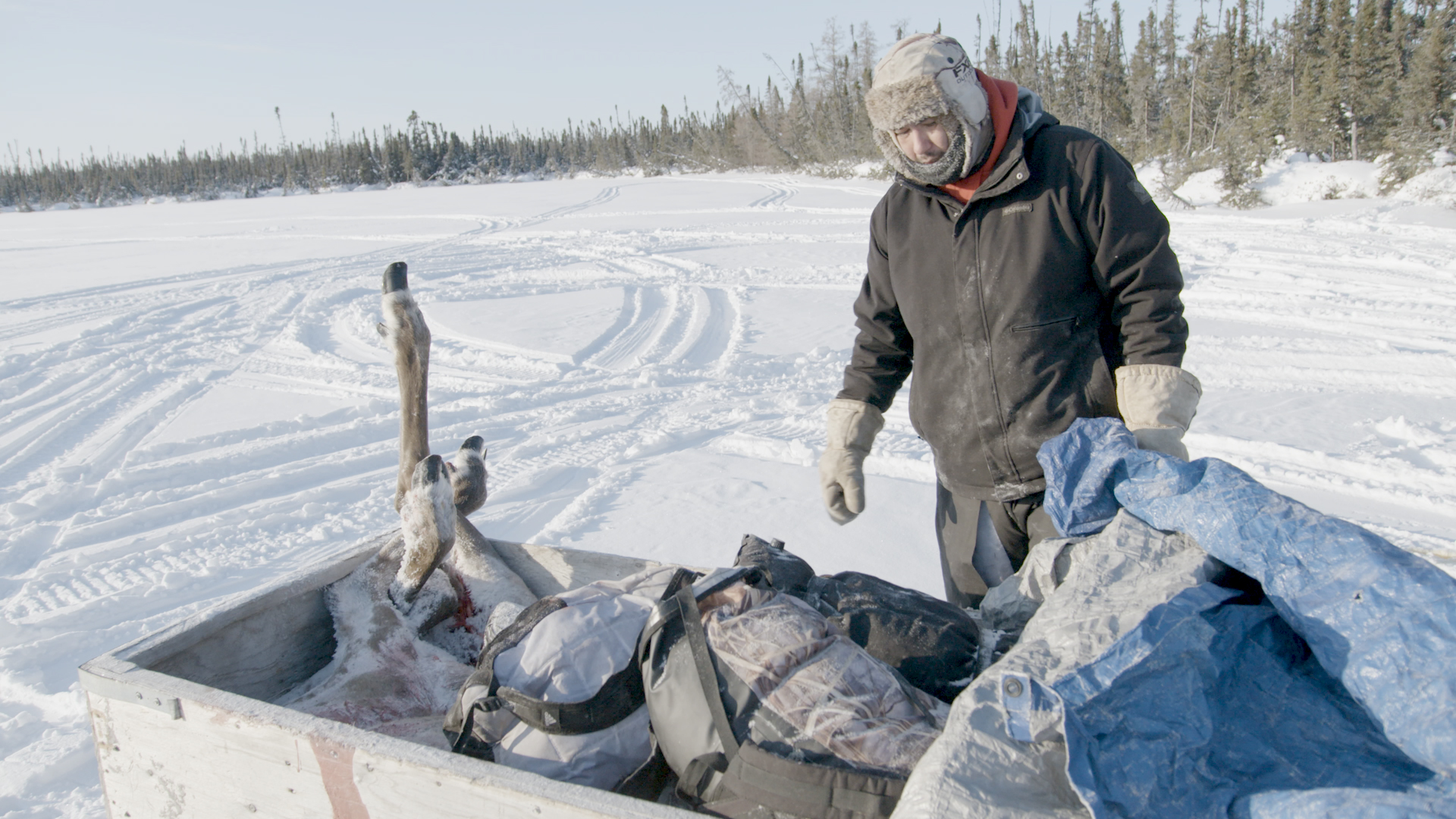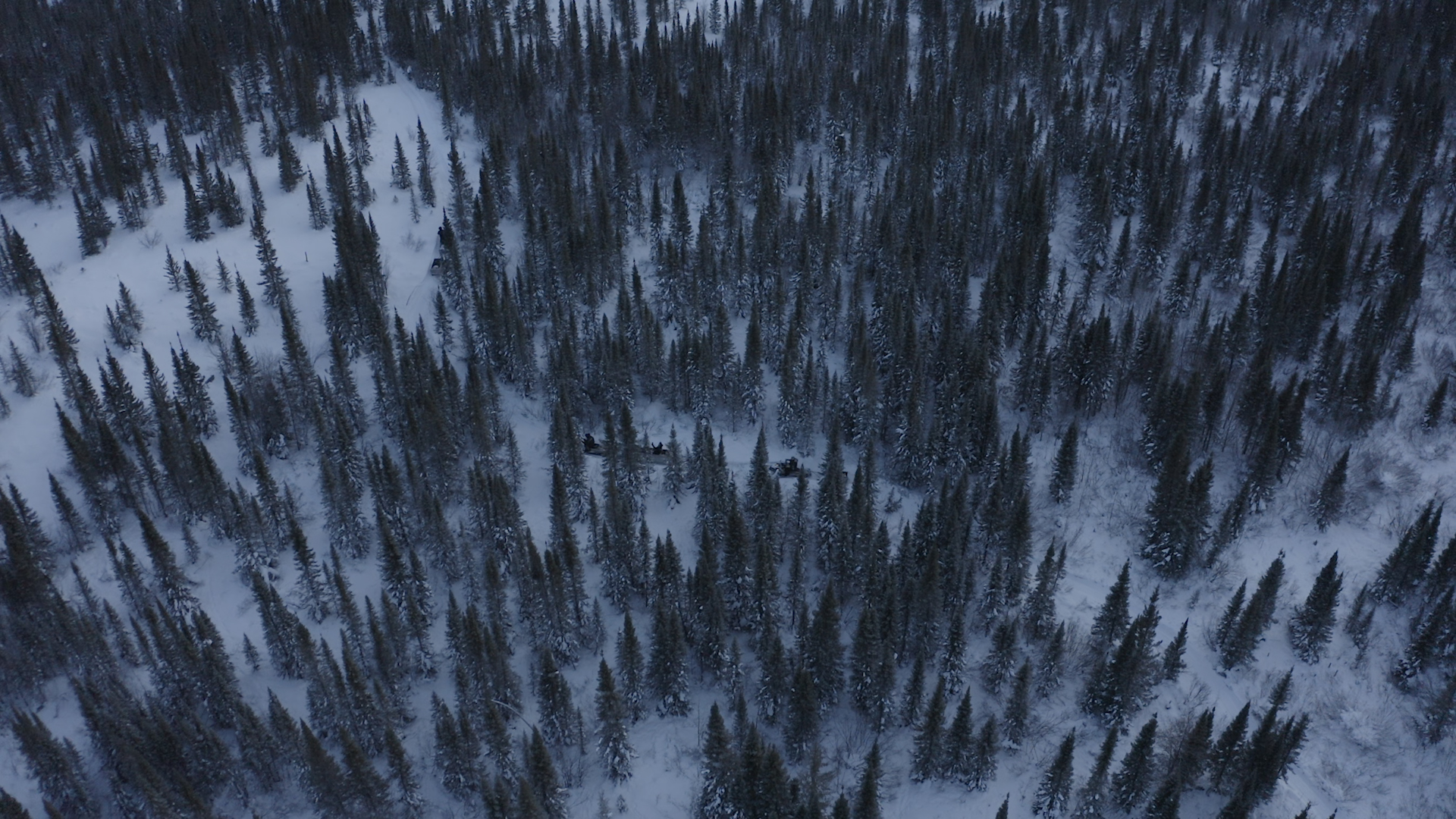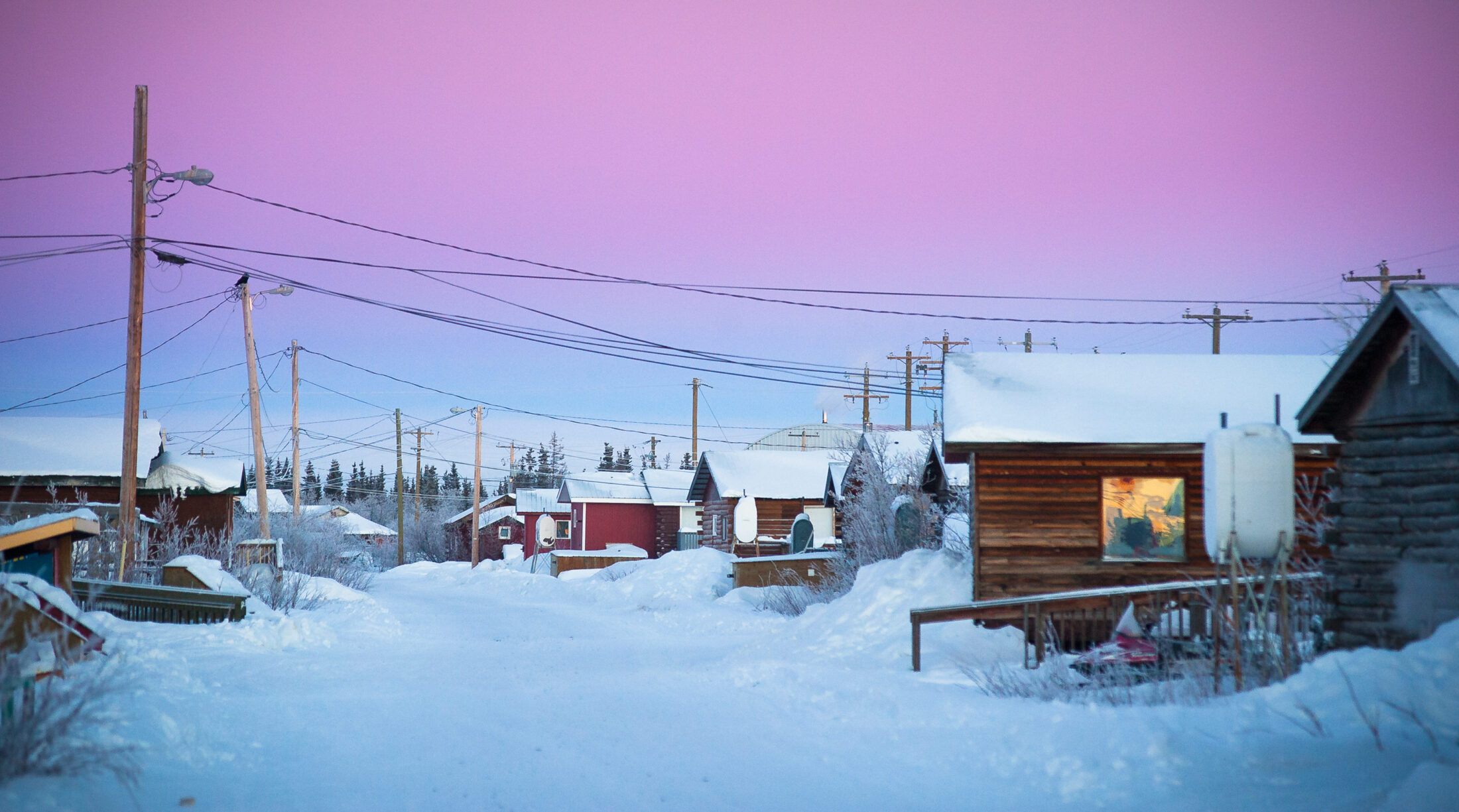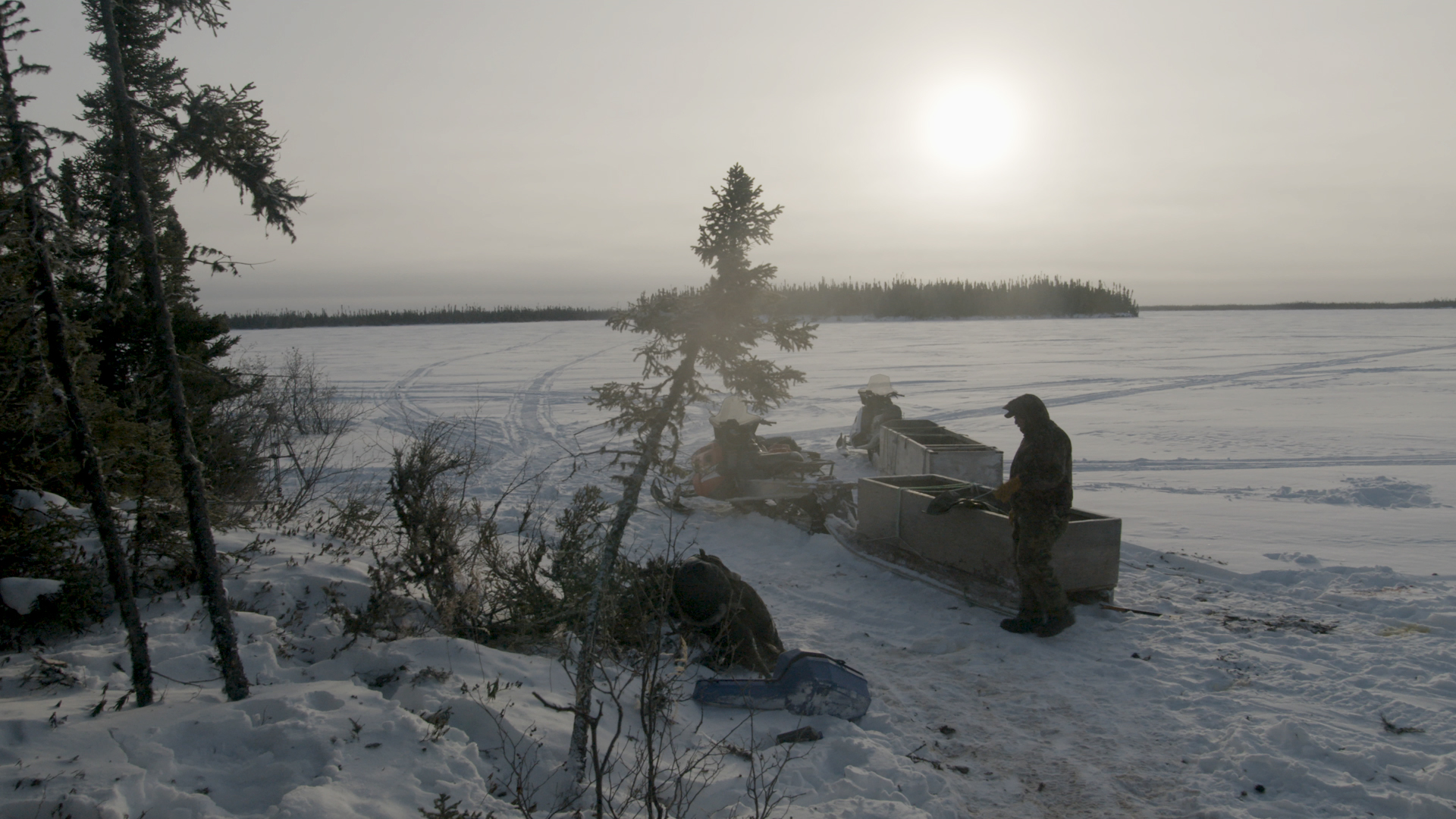
Drawing (on) a decade of climate change in the North
Artist Alison McCreesh’s latest book documents her travels around the Arctic during her 20s. In...
Canada’s failure to act on climate change is putting First Nations’ access to nutritious, traditional foods at risk, diminishing health and cultural ties, according to a report released Wednesday by Human Rights Watch.
The report documents the impact of climate change on food insecurity in several First Nations communities that subsist on caribou, moose, salmon and berries — foods that have been relied on for generations and are inseparable from their cultures.
The authors visited the communities in northern Ontario, northwest B.C. and northern Yukon and spoke with more than 120 people, including Indigenous people, government officials and food security experts.
“What we’ve been told in our interviews is that, in First Nations, there are already now drastic reductions in the quantity of food that people are able to harvest and, increasingly, they’re having difficulty harvesting,” said report co-author and Human Rights Watch researcher Katharina Rall.
The report, entitled “My Fear is Losing Everything,” details how longer and more intense forest fire seasons, permafrost degradation, volatile weather patterns and increased levels of precipitation are all affecting wildlife habitat and, in turn, harvesting efforts.
The report also outlines how there are more hunting and foraging risks due to warming temperatures. For instance, it’s harder — and sometimes impossible — to hunt caribou because the ice and permafrost they travel on isn’t stable enough for hunters.
“Climate change threatens to decimate these food systems, risking further serious consequences for livelihoods and health,” the report states.

Weenusk First Nation hunter Kyle Linklater packs a caribou onto a sled near Peawanuck, Ont. Photo: Daron Donahue / Human Rights Watch
First Nations children are going to school hungry more often, Rall said, and people with pre-existing medical conditions such as diabetes aren’t always able to follow their medically prescribed diets. Some First Nations people skip meals altogether, the report notes.
The report also found that climate change is driving up prices for less-nutritious, store-bought alternatives that need to be brought in from the south. This is in part due to the fact that roads constructed from snow and ice are becoming less reliable because of warmer winters, meaning food needs to be flown in, which is far more expensive. This compounds the risk of food poverty for First Nations people, the report states.
“All the things we documented are going to get much, much worse in the coming years, and certainly, if there’s no appropriate action to reduce emissions, the future scenario is really devastating,” she said.
Not only that, Indigenous Peoples in Canada are among the lowest contributors to greenhouse emissions in the country, yet research shows they are among the most exposed to climate change impacts.
Canada gets a failing grade on mitigating the effects of climate change, according to the report. The country is among the top 10 emitters of greenhouse gas emissions in the world, with per capita emissions upward of four times higher than the global average, the report states, noting that between 1990 and 2017, emissions increased by roughly 19 per cent, mainly due to mining and oil and gas production.
Canada is warming roughly twice as fast as the global average; in the North, it’s even worse, with temperatures rising three times as quick.
While the Government of Canada has pledged to reduce greenhouse gas emissions 30 per cent below 2005 levels by 2030 and reach net-zero emissions by 2050, it remains unclear how it intends to pull off these goals, Rall said.
“This needs to urgently change,” she said.

Weenusk First Nation members hunt near Peawanuck, Ont., a northern community that’s warming faster than the rest of Canada. Photo: Daron Donahue / Human Rights Watch
The northernmost community researchers focused on was the Gwich’in community of Old Crow, Yukon, which can only be reached by air travel. This is a place where citizens spend 41 per cent of their monthly budgets on healthy food, according to the report. In Whitehorse, which is roughly 800 kilometres south of Old Crow, families spend 17.5 per cent of their budget on the same diet.
Researchers heard from citizens that harvesting seasons are truncated, with access to flora and fauna in the area increasingly limited. This is leading more people to the grocery store, where prices can be inflated for fresh produce that has a very short shelf life.
Dana Tizya-Tramm, Chief of Vuntut Gwitchin First Nation of Old Crow, told The Narwhal that citizens are, indeed, seeing climate change effects happening right before their eyes. Five lakes in the area have been draining at an increased rate, a known effect of permafrost thaw, which is causing the land to give way and cloud the waters, he said. And drunken forests — where trees dramatically lean due to thawing permafrost — are more common now, he added.

Families in Old Crow, Yukon, spend more than 40 per cent of their household budgets on healthy food. Photo: Matt Jacques / The Narwhal
There are also fewer Porcupine caribou, a sacred animal to the Gwich’in, Tizya-Tramm said. He chalks this up to a species of willow choking out lichen, a staple food source for caribou, but isn’t sure if the willows are driven by climate change. An increase in forest fires may also be affecting the herd’s migratory patterns, he added. (The range of the Porcupine caribou spans from Alaska to the Northwest Territories.)
“If we don’t have access to our foods and begin to lose that culture, if our youth are not getting out with our elders, then of course that leaves them without the skills or the confidence [to hunt], which leads back to the stores for food, which atrophies that traditional link,” he said.
“The change that we’re seeing now signals a paradigm shift that is going to come in our environment. Humans continue to push nature to its edge.”
Canada needs to commit to more concrete action, not just make another announcement, Rall said.
While there are some good government programs, they still have problems that need to be ironed out, she added.
Take Nutrition North, which launched in 2011 and subsidizes the delivery of nutritious food from the south to northern locales. Unfortunately, even with the delivery subsidized, the food is still prohibitively expensive for some people.
The carbon tax could also drive up food prices for First Nations, the report says.
“While the policy includes a tax-based rebate intended to mitigate the impacts of these price increases on lower-income people, the federal government has acknowledged this method is ineffective for First Nations given legislated tax exemptions that mean many First Nations people on-reserve do not file federal tax returns,” the report states.

Weenusk First Nation member Mike Wabano sets up camp for caribou hunting on a frozen river near Peawanuck, Ont. Photo: Daron Donahue / Human Rights Watch
Human Rights Watch lays out several recommendations for the federal government, including that Canada deem the right to food a basic human right, strengthen its climate change policies to reduce emissions, improve climate adaptation measures in First Nations and support a transition toward renewable energy, including for First Nations, in the COVID-19 stimulus package.
“Ultimately, Canada’s climate policies are insufficient and poorly designed, contributing to a double bind for First Nation Peoples,” the report states.
Asked whether the federal government will accept the recommendations, a spokesperson from Crown-Indigenous Relations and Northern Affairs didn’t explicitly answer.
“We participated in the research behind this report, and we welcome its conclusions as important contributions to the wider conversation around climate change,” Christina Tricomi said in an email. “We look forward to continuing to work collaboratively with Inuit, First Nation and Métis communities, provincial and territorial governments, other federal departments and other governments and organizations around the world to address immediate concerns and find long-term solutions to these complex challenges.”
Of all of the jurisdictions that Human Rights Watch looked at, Yukon was the only one that is “taking its obligation to address climate change impacts on First Nations, including their right to food, seriously,” the report says.
The Yukon government’s climate change strategy, which was released in September, sets in motion work to reduce greenhouse gas emissions in the territory by 30 per cent from 2010 levels. But it also seeks to address food insecurity. By 2023, for instance, the Yukon government wants to analyze the extent of the issue in a bid to create a system that tracks levels of food insecurity into the future.
Under the strategy, the government will aim to complete risk assessments and emergency plans for every Yukon community by 2022.
“It seems like there’s awareness and acknowledgement that this is important.”
Human Rights Watch recommends the Yukon government implement a program to monitor First Nations food insecurity linked to climate change as soon as possible.
Roxanne Stasyszyn, a spokesperson for Environment Yukon, said the Yukon government has already committed to monitoring food insecurity through its climate change strategy.
“It seems like there’s awareness and acknowledgement that this is important,” Rall told The Narwhal. “Their plan is really a step in the right direction in that it commits to assessing climate impacts on food insecurity and also that First Nations people are central in finding a response to climate change.”
“What needs to happen now, of course, is to implement all those commitments.”
Editor’s disclosure: Julien Gignac, the author of this article, worked as an independent consultant for Human Right Watch in 2017 for an unrelated project that documented the experiences of Indigenous women and distrust toward the RCMP.
Get the inside scoop on The Narwhal’s environment and climate reporting by signing up for our free newsletter. On March 17, federal Conservative Leader Pierre Poilievre...
Continue reading
Artist Alison McCreesh’s latest book documents her travels around the Arctic during her 20s. In...

I’ve watched The Narwhal doggedly report on all the issues that feel even more acutely...

Establishing the Robinson Treaties, covering land around Lake Huron and Lake Superior, created a mess...
